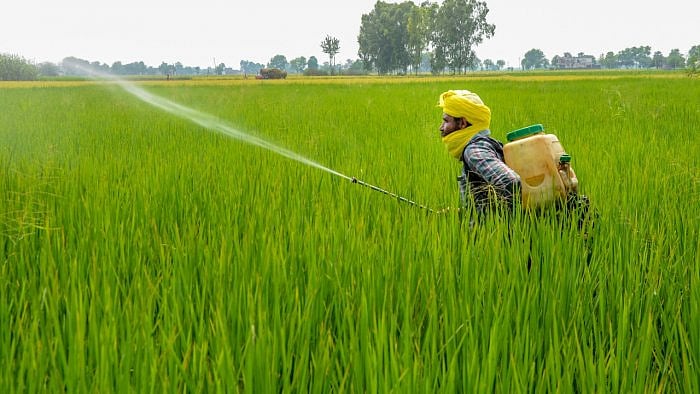
Recently, the Union Ministry of Agriculture and Farmers’ Welfare issued a notice restricting the use of a widely used herbicide, glyphosate. The main reason behind this is the hazardous impact the chemical has on the health of humans and animals. However, the Pest Control Operators (PCOs) are authorised to use it on non agricultural crops or to contain pests.
Legally, the use of glyphosate formulations, or the chemical weed killer, is restricted to be used in tea plantations and non-plantation areas accompanying the tea crop. Any use beyond this is illegal and a violation of the Insecticides Act 1968. But in reality, India has literally become a glyphosate country.
The chemical is widely used in non-tea-growing states for purposes that are unimaginable. According to a study conducted by the Indian Council of Agricultural Research (ICAR), it is used in cereals, pulses, oilseeds, fruits, and vegetables. In addition to this, it is used to remove unwanted weeds from courtyards, schools, parks, offices, roadsides, and railway tracks.
The non-availability and high costs of agriculture labour paved the way for the rampant use of weedicides, which are cost effective for farmers. Widespread use of glyphosate for de-weeding in the agricultural sector has snatched the employment opportunities of the poorest group of landless labourers, especially the female workforce.
It is shocking that in Punjab, the farmers spray herbicide on a standing crop of moong or green-gram to facilitate the drying for an early harvest; in Karnataka, it is sprayed on areca nuts to remove the moisture. It is also used in beans, okra, and other vegetables before harvesting.
Obviously, this hazardous product has penetrated our agricultural fields, horticulture gardens that grow fruits, and forest areas that are our water sources. Though it is illegal to be used in these areas, our governments and agricultural scientists have deliberately ignored this chemical war on weeds even as glyphosate poisons our soil, water, and crops. This will have disastrous consequences for health of people and ecosystems.
The adverse impact of glyphosate is not limited to humans. Researchers have found evidence of its deleterious effects on the environment and its harmful effect on fish, crustaceans, and amphibians, as well as beneficial bacteria and microorganisms in soil and water.
Studies conducted over the years have shown that the use of glyphosate is hazardous to bees. Though it may not kill bees en masse, its effects might be subtle -- inhibiting the growth of larva, diminishing their navigational skills, altering their foraging behaviour, or even disrupting their gut microorganisms. This will have an overall impact on the bee population, which is essential for pollination of crops.
Alarmed by the negative impact of glyphosate, some states like Kerala and Punjab have tried to ban and restrict its sale in their respective states. However, these initiatives failed as it was widely available across the country. Pesticides Action Network (PAN) released a detailed study report on glyphosate use in India in 2020, outlining the dangers posed to human health and the environment.
Nevertheless, the central government allowed the sale of weedicide across the country. The present notification by the central government is a half-hearted attempt to address the problem, as the loophole of this being permitted to be used ‘on non agricultural crops or to control pests’ through nonexistent PCOs and a weak regulatory system.
The pesticide sector contributes $ 5 billion annually, and it is ever growing, spreading its tentacles across the country, even in the remotest regions. Major multinational seed and pesticide companies have a strong presence in India. With such vested interests and a profit motive, it is too naive to believe that the government will enact any policies that will ban the use of glyphosate in India.
The ubiquitous presence of glyphosate can be found not only on agri fields worldwide, but the researchers have detected traces of this chemical in the urine of children in remote villages in Laos and babies in New York! This toxic substance persists in soil and water bodies and enters the food chain, leading to high levels of accumulation in human bodies. Though the International Agency for Research on Cancer has classified it as a probable human carcinogen, the companies that are engaged in manufacturing it claim that it is safe.
Extensive use of weedicides over the years poses the danger of weeds developing resistance to glyphosate, paving the way for the creation of superweeds that might be difficult to control, forcing us onto the pesticide treadmill.
The government must phase out glyphosate at the earliest, before it destroys our soil, water, and the health of citizens. Any compromise will lead to irreversible damage, affecting the present and future generations.
(The writer is a Uttara Kannada-based environmentalist)